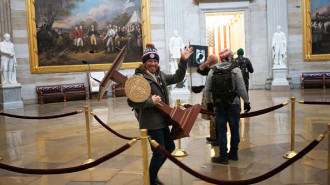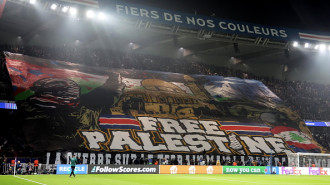HRW: Israel committing war crimes in Gaza
HRW: Israel committing war crimes in Gaza
Human Rights Watch says Israeli officials who authorised the use of live ammunition against Palestinians who approached the fence should be held accountable for war crimes.
3 min read
Israeli soldiers killed at least 125 Palestinians protesting in Gaza [Getty]
Israeli forces' repeated use of lethal force in the Gaza Strip against Palestinian demonstrators who posed no imminent threat to life may amount to war crimes, Human Rights Watch said on Wednesday.
The rights group has joined calls demanding the International Criminal Court to open a formal investigation into the massacre, and for the UN General Assembly to adopt a resolution condemning Israel's actions. It also wants countries to impose targeted sanctions against officials responsible for authorising the use of live ammunition against protesters.
"Israel's use of lethal force when there was no imminent threat to life has taken a heavy toll in life and limb," said Sarah Leah Whitson, Middle East director at Human Rights Watch. "The international community needs to rip up the old playbook, where Israel conducts investigations that mainly whitewash the conduct of its troops and the US blocks international accountability with its Security Council veto, and instead impose real costs for such blatant disregard for Palestinian lives."
Israeli troops have shot and killed at least 125 Palestinians and injured thousands more since 30 March, when mass protests began at the Gaza border. The massacre drew international condemnation, with the UN set to send war crimes investigators to the besieged enclave.
The HRW report comes on the day the UN General Assembly will vote whether to approve an Arab-backed a resolution condemning Israel's "excessive use of force" and calling on UN officials to suggest recommendations for protecting Palestinian civilians.
During the weekly Great Return March protests, the Israeli military shot and killed protesters on the basis of a policy, according to public statements by Israeli officials and a submission to Israel's Supreme Court, to use live ammunition against those who approached or attempted to cross or damage the fences, the HRW report said.
HRW named these officials as chief of staff, Lt. Gen. Gadi Eizenkot, Defence Minister Avigdor Lieberman and Prime Minister Binyamin Netanyahu.
Ahead of the first protest on 30 March, Eizenkot told Israeli media that "a big portion of the army" as well as more than 100 snipers would be present and that "the orders are to use a lot of force".
Netanyahu chastised critics of the military's actions and said "we will give [Israeli soldiers] all the backing they need to do their holy work".
Among those killed in the Gaza massacre since 30 March were medics, children and journalists.
Drawing on witness testimonies, HRW said Palestinians were shot by Israeli forces when they were standing still or running away from the fence. The heavily fortified border also undercuts claims that Palestinians posed an imminent threat to Israeli soliders, HRW said.
The rights group said that "given [the] strong evidence" ICC prosecutor Fatou Bensouda should open a formal probe into Israeli crimes against humanity against Palestinians. These acts include persecution, murder or serious injury and suffering, committed on a widespread or systematic basis as part of an "attack on a civilian population," involving a plan or policy to commit the crime.
Bensouda said last month that she was watching closely killings in Gaza, and would "take any action warranted" to prosecute anyone deemed to be a suspected war criminal.
"Impunity for unlawfully killing and maiming people in Gaza risks continuing the cycle where still more lives and families will be torn apart in the future," Whitson said. "The UN Human Rights Council inquiry should identify and call for sanctions against officials implicated in ongoing serious human rights violations."
The rights group has joined calls demanding the International Criminal Court to open a formal investigation into the massacre, and for the UN General Assembly to adopt a resolution condemning Israel's actions. It also wants countries to impose targeted sanctions against officials responsible for authorising the use of live ammunition against protesters.
"Israel's use of lethal force when there was no imminent threat to life has taken a heavy toll in life and limb," said Sarah Leah Whitson, Middle East director at Human Rights Watch. "The international community needs to rip up the old playbook, where Israel conducts investigations that mainly whitewash the conduct of its troops and the US blocks international accountability with its Security Council veto, and instead impose real costs for such blatant disregard for Palestinian lives."
Israeli troops have shot and killed at least 125 Palestinians and injured thousands more since 30 March, when mass protests began at the Gaza border. The massacre drew international condemnation, with the UN set to send war crimes investigators to the besieged enclave.
The HRW report comes on the day the UN General Assembly will vote whether to approve an Arab-backed a resolution condemning Israel's "excessive use of force" and calling on UN officials to suggest recommendations for protecting Palestinian civilians.
During the weekly Great Return March protests, the Israeli military shot and killed protesters on the basis of a policy, according to public statements by Israeli officials and a submission to Israel's Supreme Court, to use live ammunition against those who approached or attempted to cross or damage the fences, the HRW report said.
HRW named these officials as chief of staff, Lt. Gen. Gadi Eizenkot, Defence Minister Avigdor Lieberman and Prime Minister Binyamin Netanyahu.
Ahead of the first protest on 30 March, Eizenkot told Israeli media that "a big portion of the army" as well as more than 100 snipers would be present and that "the orders are to use a lot of force".
Netanyahu chastised critics of the military's actions and said "we will give [Israeli soldiers] all the backing they need to do their holy work".
Among those killed in the Gaza massacre since 30 March were medics, children and journalists.
Drawing on witness testimonies, HRW said Palestinians were shot by Israeli forces when they were standing still or running away from the fence. The heavily fortified border also undercuts claims that Palestinians posed an imminent threat to Israeli soliders, HRW said.
The rights group said that "given [the] strong evidence" ICC prosecutor Fatou Bensouda should open a formal probe into Israeli crimes against humanity against Palestinians. These acts include persecution, murder or serious injury and suffering, committed on a widespread or systematic basis as part of an "attack on a civilian population," involving a plan or policy to commit the crime.
Bensouda said last month that she was watching closely killings in Gaza, and would "take any action warranted" to prosecute anyone deemed to be a suspected war criminal.
"Impunity for unlawfully killing and maiming people in Gaza risks continuing the cycle where still more lives and families will be torn apart in the future," Whitson said. "The UN Human Rights Council inquiry should identify and call for sanctions against officials implicated in ongoing serious human rights violations."
![gaza [getty] gaza [getty]](/sites/default/files/styles/large_16_9/public/media/images/2C84BBAC-D958-434B-BE55-452D86E9905A.jpg?h=d1cb525d&itok=f-frdDrM)
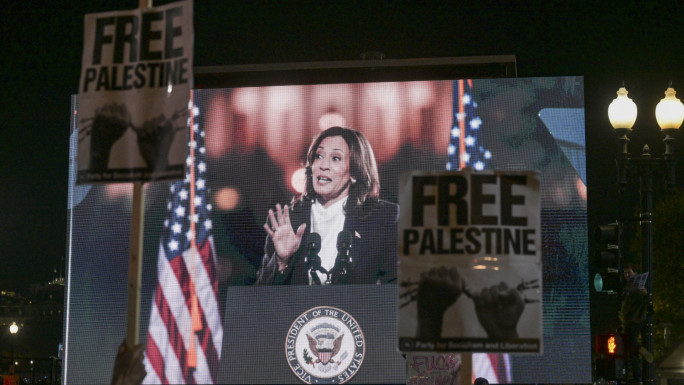
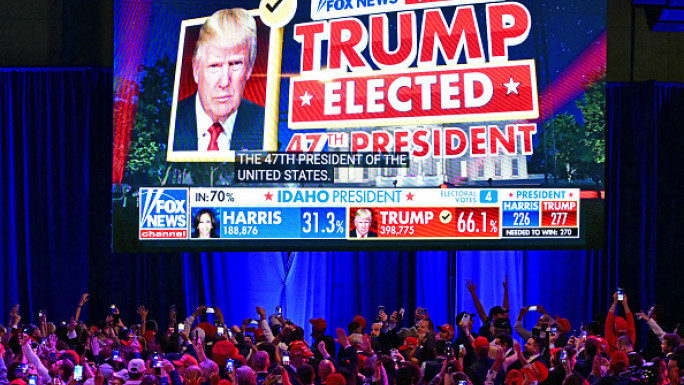
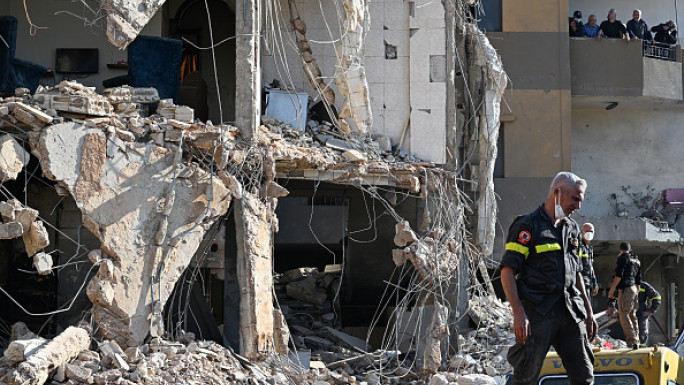
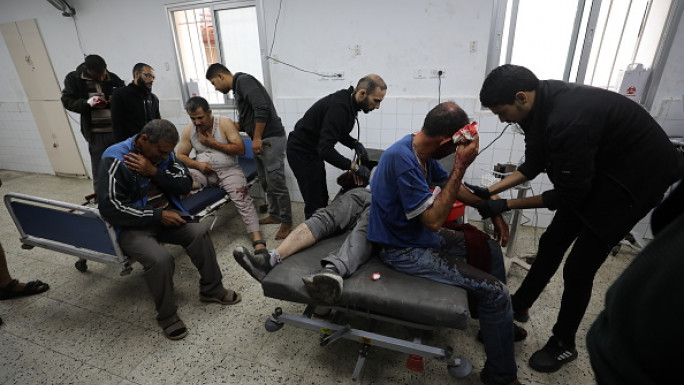
 Follow the Middle East's top stories in English at The New Arab on Google News
Follow the Middle East's top stories in English at The New Arab on Google News
![President Pezeshkian has denounced Israel's attacks on Lebanon [Getty]](/sites/default/files/styles/image_330x185/public/2173482924.jpeg?h=a5f2f23a&itok=S2wzLy-W)
